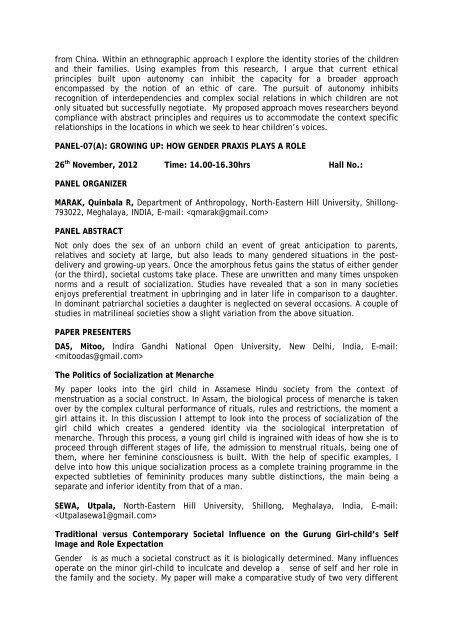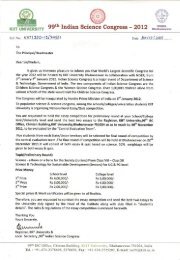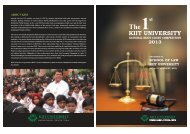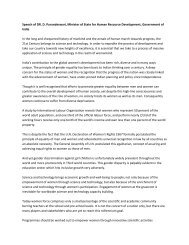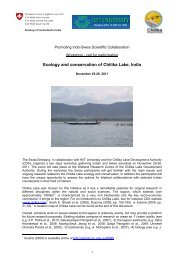PANEL ORGAN - KIIT University
PANEL ORGAN - KIIT University
PANEL ORGAN - KIIT University
You also want an ePaper? Increase the reach of your titles
YUMPU automatically turns print PDFs into web optimized ePapers that Google loves.
from China. Within an ethnographic approach I explore the identity stories of the children<br />
and their families. Using examples from this research, I argue that current ethical<br />
principles built upon autonomy can inhibit the capacity for a broader approach<br />
encompassed by the notion of an ethic of care. The pursuit of autonomy inhibits<br />
recognition of interdependencies and complex social relations in which children are not<br />
only situated but successfully negotiate. My proposed approach moves researchers beyond<br />
compliance with abstract principles and requires us to accommodate the context specific<br />
relationships in the locations in which we seek to hear children’s voices.<br />
<strong>PANEL</strong>-07(A): GROWING UP: HOW GENDER PRAXIS PLAYS A ROLE<br />
26 th November, 2012 Time: 14.00-16.30hrs Hall No.:<br />
<strong>PANEL</strong> <strong>ORGAN</strong>IZER<br />
MARAK, Quinbala R, Department of Anthropology, North-Eastern Hill <strong>University</strong>, Shillong-<br />
793022, Meghalaya, INDIA, E-mail: <br />
<strong>PANEL</strong> ABSTRACT<br />
Not only does the sex of an unborn child an event of great anticipation to parents,<br />
relatives and society at large, but also leads to many gendered situations in the postdelivery<br />
and growing-up years. Once the amorphous fetus gains the status of either gender<br />
(or the third), societal customs take place. These are unwritten and many times unspoken<br />
norms and a result of socialization. Studies have revealed that a son in many societies<br />
enjoys preferential treatment in upbringing and in later life in comparison to a daughter.<br />
In dominant patriarchal societies a daughter is neglected on several occasions. A couple of<br />
studies in matrilineal societies show a slight variation from the above situation.<br />
PAPER PRESENTERS<br />
DAS, Mitoo, Indira Gandhi National Open <strong>University</strong>, New Delhi, India, E-mail:<br />
<br />
The Politics of Socialization at Menarche<br />
My paper looks into the girl child in Assamese Hindu society from the context of<br />
menstruation as a social construct. In Assam, the biological process of menarche is taken<br />
over by the complex cultural performance of rituals, rules and restrictions, the moment a<br />
girl attains it. In this discussion I attempt to look into the process of socialization of the<br />
girl child which creates a gendered identity via the sociological interpretation of<br />
menarche. Through this process, a young girl child is ingrained with ideas of how she is to<br />
proceed through different stages of life, the admission to menstrual rituals, being one of<br />
them, where her feminine consciousness is built. With the help of specific examples, I<br />
delve into how this unique socialization process as a complete training programme in the<br />
expected subtleties of femininity produces many subtle distinctions, the main being a<br />
separate and inferior identity from that of a man.<br />
SEWA, Utpala, North-Eastern Hill <strong>University</strong>, Shillong, Meghalaya, India, E-mail:<br />
<br />
Traditional versus Contemporary Societal Influence on the Gurung Girl-child’s Self<br />
Image and Role Expectation<br />
Gender is as much a societal construct as it is biologically determined. Many influences<br />
operate on the minor girl-child to inculcate and develop a sense of self and her role in<br />
the family and the society. My paper will make a comparative study of two very different


